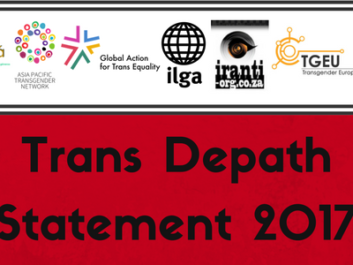Statement on the International Day of Action for Trans Depathologization 2017

The signatories of this Statement are activists representing different trans regional networks and international initiatives. This year, the International Day of Action for Trans Depathologization has a particular relevance for all our communities around the world: the largely due process of revision and reform of the tenth version of International Classification of Diseases will be completed next year. We expect the World Health Assembly to pass a new ICD (called ICD-11) in June 2018. During the upcoming months all of us will be working together to accomplish trans depathologization while ensuring full access to healthcare and its coverage. The technical and political process around ICD-11 still poses serious challenges, including the continuing pathologization of gender diversity in childhood, the lack of transparent and official information and the exclusion of trans people from decision-making processes. However, this particular edition of the International Day of Action for Trans Depathologization requires to expand the focus of our shared statement to reflect on extremely concerning developments.
In spite of some key advances in legal gender recognition, access to trans specific healthcare is still conditioned by pathologizing requirements in most countries where available. It is necessary to remember, today more than ever, the intrinsic connection between trans depathologization and the right of taking autonomous decisions about our own bodies. That connection is not only denied by the persistence of pathologization as a requirement for accessing hormones, surgeries and other gender affirming procedures, but also by socioeconomic injustice.
Worldwide, trans people face increasing barriers in accessing transitional healthcare, due to the deadly combination of massive impoverishment, shrinking public health systems, privatization of healthcare and institutional stigma, discrimination and violence. Asylum seekers, refugees and migrants are severely impacted in different regions. Budget cuts are affecting trans people´s access to other treatments, including those for HIV, Hepatitis C, tuberculosis and removal of industrial silicone. In this political context, many trans people are forced to join the military to secure, to be diagnosed as mentally or physically disordered, or to renounce their sexual and reproductive rights just to have access to healthcare. Governments and media contribute to create and reproduce the idea of trans people’s health needs as burdensome, unfair when compared with other health issues (i.e., cancer) and privileged, aggravating cissexism and transphobia.
Trans exclusionary dynamics are being deeply worsened by other associated human rights violations, including the widespread revival of so called “conversion” and “reparative” therapies, the legal and religious persecution against LGTB people in different countries, and the constant reality of violence against trans and gender diverse people and the impunity of its perpetrators.
On this International Day of Action for Trans Depathologization, we call our communities and allies to come together for everyone´s universal access to legal gender recognition, to healthcare and its coverage, to protection against all forms of stigma, discrimination and violence, and to adequate reparations. In this world, trans depathologization is not only about the psycho-medical classification of our lives, but about our very right to live.
In solidarity,
Mauro Cabral Grinspan
Executive Director
Global Action for Trans Equality (GATE)
Amets Suess Schwend
Member of the coordination team
STP, International Campaign Stop Trans Pathologization
Richard Köhler
Senior Policy Officer
Transgender Europe (TGEU)
Cianán B. Russell
Human Rights & Advocacy Officer
Asia Pacific Transgender Network (APTN)
Viviane Vergueiro Simakawa
Project Coordinator, Akahatá Equipo de Trabajo en Sexualidades y Géneros
Akahata Equipo de Trabajo en Sexualidades y Generos
Zhan Chiam
Senior Programme Officer, Gender Identity and Gender Expression
International Lesbian, Gay, Bisexual, Trans and Intersex Association (ILGA)
Joshua Sehoole
Regional Manager
Iranti-Org